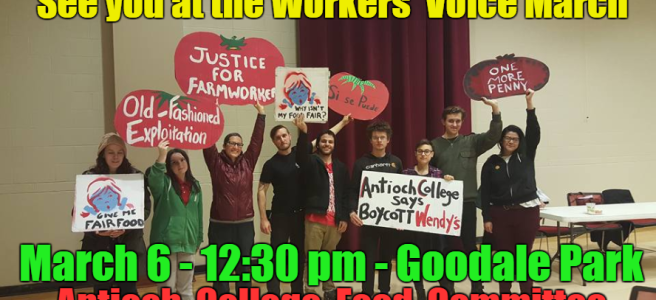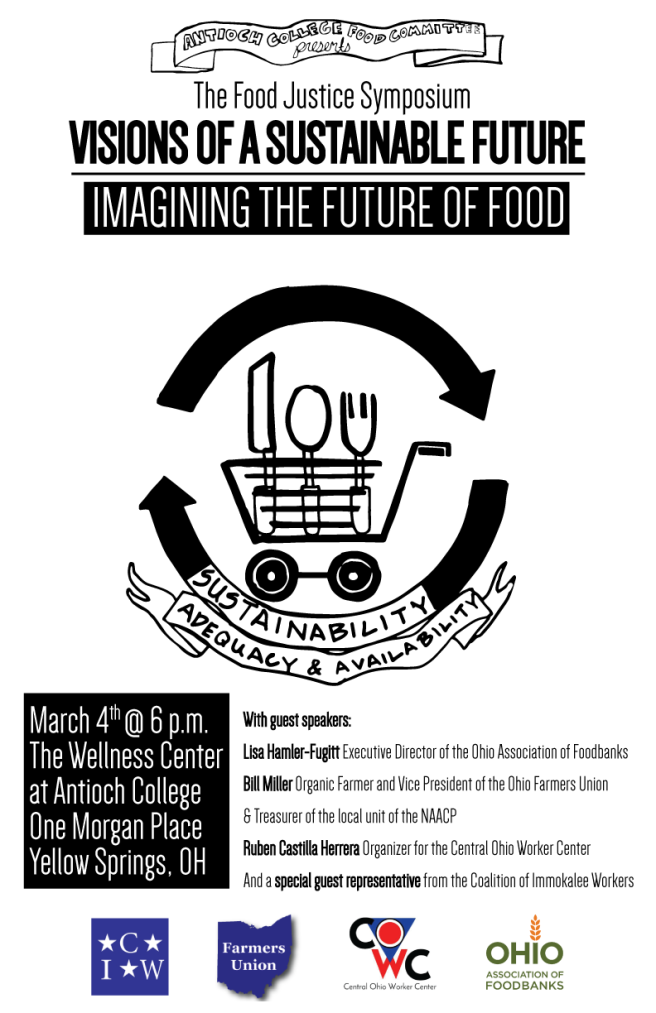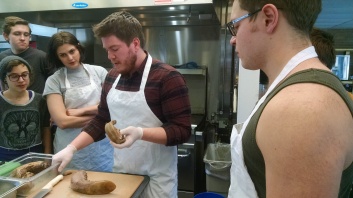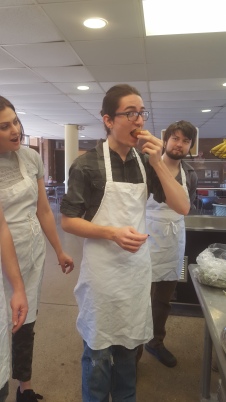Thoughts from the March in Support of the Coalition of Immokalee Workers
Guest writer Tyler Clapsaddle is an avid participant with Antioch College Food Committee, a first year student, a lover of soil, a and music maker. He is from the sleepy city of Salem, Oregon. His favorite vegetable is the beet, although he is partial to yams.
Last Sunday, on March 6, five Antioch students (myself among them) traveled to Columbus, Ohio, for a march in support of the Coalition of Immokalee Workers’ boycott on Wendy’s. The Coalition of Immokalee Workers represents a powerful force within the national food justice movement. Based in Immokalee, Florida, the CIW has vigorously fought for workers’ wages and rights, the prevention of sexual harassment in agricultural fields, and against the rampant human-trafficking in agricultural labor. Their Fair Food Program has been largely successful; 14 corporations have signed on, including Taco Bell, McDonald’s, Sodexo, and Walmart. By taking part in the program, these participating vegetable buyers pay a small premium on their vegetables, generating better wages and conditions for the workers picking the very same vegetables. Wendy’s is currently the only major fast-food chain to not participate in the program, and currently refuses to even meet with Coalition representatives.

I first learned of the CIW and their work through the documentary Food Chains (2015). The film streams on Netflix and wonderfully captures the dedication of the organization. After Ruben Castilla Herrera spoke at the Antioch College Food Committee’s Food Justice Symposium, a couple students scrambled furiously to find transportation. Henry Williams ‘18 volunteered, and drove myself, Samuel Eagleburger ‘19, Lauren Gjessing ‘17, and Myrcka del Rio ‘17 to Goodale Park, where the march was set to begin. After parking and beginning our walk to the park, we could see the hundreds of people gathering, signs in hand, near a large truck donned with “Boycott Wendy’s” flags and banner that read “Wendy’s– JOIN THE FAIR FOOD PROGRAM”. Passerby stopped us on our way (the sign we were carrying pointed us out as supporters) and questioned us about why anyone would ever boycott Wendy’s.
There, in Goodale Park, an unexpected atmosphere manifested. I was struck by how communal this cause was– how the CIW did not use anger as their primary fuel for their mission, but instead used a celebration of their workers in order to bring awareness, along with efficient organizing and an appeal to morals. Whether or not this works for every campaign, the group dynamic among the 300-some protesters was open, inviting, and friendly. This continued even when we stared through the windows of the Wendy’s on N High and E 18th at the customers munching on burgers dripping with exploitation.
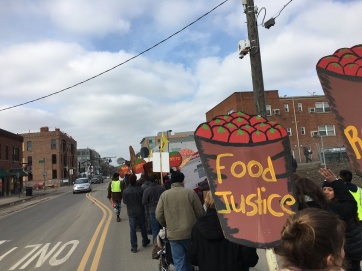
The highlight of my experience came when I saw Henry Williams ‘18, enter the Wendy’s we were circled around, only to come out a minute later absolutely furious. The pamphlets he kindly distributed among customers were thrown away immediately by the manager, and Henry was asked to leave. It made me wonder what the typical American thinks about political action and protesting.“I think protesting is an incredibly effective tool because it forces people to look at in justice in the face and not be able to conveniently turn a blind eye,” says Sam Eagleburger ‘19 on the use of protesting for justice. Although an Antioch student is not the typical American, I agree with Sam. The employees and customers at Wendy’s were made uncomfortable, were put on the spot, and were pushed to re-examine their conceptions about their food. Whether they kept their mind open to change is entirely up to them. I wonder how to bring change in the most apathetic of minds.
The march ended in a park. Bagels and hot chocolate was served. A rapper by the name Olemeca performed, and then a political theater art piece was performed in which Wendy’s was wed to Mr. Exploitation. That was as beautiful as it sounds.

The CIW’s aim is fairness and justice in food production. It seems simple, but the current system treats migrant workers as expendable and exploitable without regard to their humanity. The CIW’s efforts are a model example of workers standing up for their rights, but Wendy’s slows down the progress toward food justice for conventional agricultural field workers. But whether or not the Wendy’s higher-ups finally decide to meet with the CIW and sign the Fair Food Agreement it is not simply up to Wendy’s. No, I am of the firm belief that Wendy’s will steer toward justice and moral treatment of workers if and only if the CIW receives overwhelming support. We, consumers, have power over large corporations only through organizing in large numbers. If you are interested in organizing further programming in support of CIW, please contact the Antioch College Food Committee at foodcommittee@antiochcollege.org.
#boycottwendys
Sources:
http://www.fairfoodprogram.org/
–Guest Writer Tyler Clapsaddle

